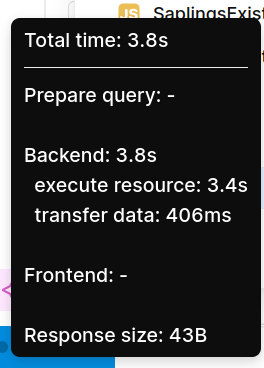Hii Everyone,
I have an application that uses database on atlas server. The application performs a number of mongo queries on the database. The mongo queries(a regular findOne query too) are slow and take almost 3-4 sec to return a required document. I use the same application on my self hosted retool along with my local mongodb database, the same queries take 1/10 less time(approx 0.3 sec). I tried changing the mongo version to 3.6 and above still the issue persists.
Could you please guide me to find the reason so as to why the queries take so long..
I have added a screenshot of the query stats.

I am still in the learning process. I would appreciate and would be grateful for any help that would be offered.
Thankyou
@Kabirdas @Tess
Hi Namrata!
It's true that running your application with a local MongoDB on Retool can be noticeably faster, sometimes even up to ten times faster. This happens for a couple of reasons:
1. No Network Journey: With a local MongoDB, the data doesn't have to travel over the internet, which eliminates network latency. Think of it like sending a letter within your house versus mailing it across the country. Local delivery is naturally faster.
2. Fewer Layers, Less Traffic: When using Atlas, your application interacts with the database through several layers, including your internet connection and Atlas's infrastructure. Each layer adds a little bit of time to the process, like passing a message through several people before it reaches its destination.
3. Dedicated Resources: When you use your own computer, all its resources are focused on your application and local database. With Atlas, you share resources with other users, which can sometimes lead to slight performance variations.
I've reviewed the query stats you shared, and here are some key observations and troubleshooting steps:
1. Focus on Backend Execution:
- The majority of the time (3.4 seconds out of 3.8) is spent on backend execution, indicating a database-related bottleneck.
- This suggests that network latency or frontend issues are less likely to be the primary cause.
2. Analyze Query Execution:
- Identify missing indexes: Check if the appropriate indexes are in place for the fields involved in slow queries.
- Optimize query logic: If possible, refactor queries to reduce their complexity or data retrieval needs.
- Check Resource Utilization:
- Monitor CPU, RAM, and IOPS: Ensure your Atlas cluster has enough resources to handle the workload.
- Scale up if necessary: If resources are constrained, consider scaling up your cluster.
I hope this sets you on a good path to figuring out how to speed up your queries!
